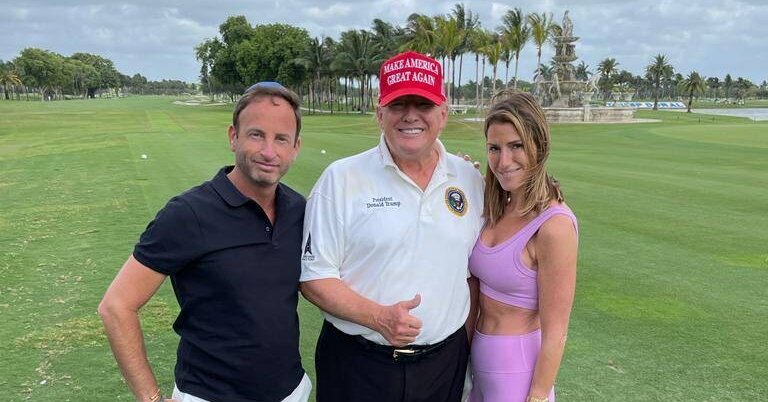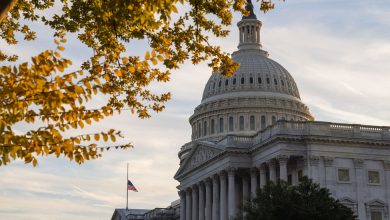A Troubling Trump Pardon and a Link to the Kushners

Even amid the uproar over President Donald J. Trump’s freewheeling use of his pardon powers at the end of his term, one commutation stood out.
Jonathan Braun of New York had served just two and a half years of a decade-long sentence for running a massive marijuana ring, when Mr. Trump, at 12:51 a.m. on his last day in office, announced he would be freed.
Mr. Braun was, to say the least, an unusual candidate for clemency.
A Staten Islander with a history of violent threats, Mr. Braun had told a rabbi who owed him money: “I am going to make you bleed.” Mr. Braun’s family had told confidants they were willing to spend millions of dollars to get him out of prison.
At the time, Mr. Trump’s own Justice Department and federal regulators, as well as New York state authorities, were still after him for his role in an entirely separate matter: his work as a predatory lender, making what judges later found were fraudulent and usurious loans to cash-strapped small businesses.
Nearly three years later, the consequences of Mr. Braun’s commutation are becoming clearer, raising new questions about how Mr. Trump intervened in criminal justice decisions and what he could do in a second term, when he would have the power to make good on his suggestions that he would free supporters convicted of storming the Capitol and possibly even to pardon himself if convicted of the federal charges he faces.
Just months after Mr. Trump freed him, Mr. Braun returned to working as a predatory lender, according to New York State’s attorney general. Two months ago, a New York state judge barred him from working in the industry. Weeks later, a federal judge, acting on a complaint from the Federal Trade Commission, imposed a nationwide ban on him.
A New York Times investigation, drawing on documents and interviews with current and former officials, and others familiar with Mr. Braun’s case, found there were even greater ramifications stemming from the commutation than previously known and revealed new details about Mr. Braun’s history and how the commutation came about.
-
The commutation dealt a substantial blow to an ambitious criminal investigation being led by the Justice Department’s U.S. attorney’s office in Manhattan aimed at punishing members of the predatory lending industry who hurt small businesses. Mr. Braun and prosecutors were in negotiations over a cooperation deal in which he would be let out of prison in exchange for flipping on industry insiders and potentially even wearing a wire. But the commutation instantly destroyed the government’s leverage on Mr. Braun.
The investigation into the industry, and Mr. Braun’s conduct, remains open but hampered by the lack of an insider.
-
At multiple levels, up to the president, the justice system appeared to fail more than once to take full account of Mr. Braun’s activities. After pleading guilty to drug charges in 2011, Mr. Braun agreed to cooperate in a continuing investigation, allowing him to stay out of prison but under supervision for nine years — a period he used to establish himself as a predatory lender, making violent threats to those who owed him money, court filings show.
Since returning to predatory lending after being freed, Mr. Braun is still engaging in deceptive business tactics, regulators and customer say.
-
In working to secure his release, Mr. Braun’s family used a connection to Charles Kushner, the father of Jared Kushner, Mr. Trump’s son-in-law and senior White House adviser, to try to get the matter before Mr. Trump. Jared Kushner’s White House office drafted the language used in the news release to announce commutations for Mr. Braun and others.
In a telephone interview, Mr. Braun said he did not know how his commutation came about.
“I believe God made it happen for me because I’m a good person and I was treated unfairly,” he said, adding that his supporters tried “multiple paths” to get him out of prison but he had no idea which one succeeded.
He said the 10-year sentence he received for marijuana trafficking was excessive and made him a victim of the criminal justice system. He denied any wrongdoing as a lender, and insisted that he had never talked to prosecutors about cooperating in the criminal predatory lending investigation.
He said he had never met Jared Kushner. And he said a picture from April 2022, showing him and his wife on a golf course with the former president, had nothing to do with the commutation but was a chance three-minute encounter during a visit to a Trump property in Florida for a Passover event.
“I didn’t meet him because of what happened, I just happened to be there the same time,” Mr. Braun said.
Mr. Braun’s commutation highlights what former administration officials say were major problems at the Trump White House as it considered clemency applications: the lack of rigorous vetting of applications and the sidelining of the Justice Department, which has traditionally screened candidates.
Mr. Kushner took a major role in the less structured vetting process that resulted in Mr. Braun’s commutation. The Justice Department investigators from Manhattan involved in the cooperation negotiations with Mr. Braun were never consulted.
As other convicts seeking clemency did, Mr. Braun’s family retained Alan Dershowitz, the prominent lawyer and Trump ally who worked with Jewish organizations pushing for pardons, at least one of which had received financial support from the Kushner family.
Mr. Dershowitz, who represented Mr. Trump in his first impeachment, had a direct line into Mr. Kushner’s office, and succeeded in helping win clemency from Mr. Trump for a number of other people. Mr. Dershowitz said he did not remember what steps he took to help Mr. Braun but said they were minimal.
Jared Kushner declined to comment, and Charles Kushner hung up when called by a reporter, as did Jacob Braun, Mr. Braun’s father. The U.S. attorney’s office in Manhattan did not respond to messages seeking comment.
A spokesman for Mr. Trump said all pardon applications “went through a vigorous vetting and review process,” but he did not address specific questions about Mr. Braun’s commutation.
William P. Barr, a Trump attorney general who had left by the time of the Braun commutation, said when he took over the Justice Department he discovered that “there were pardons being given without any vetting by the department.”
Mr. Barr added that he told Trump aides they should at least send over names of those being considered so the department could thoroughly examine their records. While the White House Counsel’s Office tried to do so, the effort fell apart under the crush of pardon requests that poured in during the final weeks before Mr. Trump left office, according to people with direct knowledge of the process.
Marc Short, the chief of staff to Mr. Trump’s vice president, Mike Pence, said when the vice president’s office was approached by Mr. Trump’s aides about clemency applications, it opted not to participate.
“The pardon process at the end of the administration was so unseemly it would make the Clintons blush,” Mr. Short said, referring to the final-days pardons issued by President Bill Clinton — including one to the fugitive financier Marc Rich, whose ex-wife donated $450,000 to Mr. Clinton’s presidential library.
Threats and a 10-Year Sentence
Mr. Braun’s path to receiving a last-minute commutation began in 2009, when the U.S. attorney’s office in Brooklyn, working with the Drug Enforcement Administration, raided what prosecutors said was a stash house for a marijuana smuggling ring run by Mr. Braun.
When Mr. Braun found out about the raid, he rented a car and drove 25 hours straight from Florida to an Indian reservation in upstate New York where, dressed in all black, he was smuggled into Canada, according to court filings. He then fled to Israel.
The Justice Department placed him on a special Interpol list that asked Israel to apprehend him. By 2010, he was back in New York, the Justice Department had charged him and he was behind bars.
In the days after his arrest, prosecutors asked a federal judge to keep him in jail until he went on trial. The prosecutors said Mr. Braun could not be deterred and was violent or willing to use the specter of violence against those who owed him money or might turn on him. Mr. Braun, the prosecutors said, had access to millions of dollars in untraceable cash, and was willing to do anything to stay out of prison.
The judge ordered that Mr. Braun be held pending trial. After nearly a year and a half in custody, Mr. Braun agreed to plead guilty. As part of the plea deal, he began cooperating secretly with the government’s investigations into other drug smugglers, particularly higher profile ones abroad, according to a former law enforcement official, who spoke on the condition of anonymity to discuss the internal workings of an investigation.
In exchange, the prosecutors agreed to release Mr. Braun from jail, putting him on house arrest and delaying his sentencing on the drug charges while they pursued new cases with his help. It is unclear what information Mr. Braun provided the authorities or whether it led to convictions.
Often, a cooperator can remain free for a few months by providing investigators with useful information. Sometimes, a court will hold off sentencing for a year or two as the cooperation continues. Throughout the process, federal authorities are supposed to monitor cooperators to ensure they do not break the law.
For reasons that remain unexplained, Mr. Braun was permitted by the U.S. attorney’s office in Brooklyn to live relatively freely for nearly the next decade, and he was able to turn his focus to an enterprise rife with cash and threats: providing loans to struggling small businesses that often had nowhere else to turn.
Former prosecutors and defense lawyers said they had never heard of a defendant being allowed to delay sentencing for such a long period or using his freedom to engage in the conduct he did. A spokesman for the Brooklyn federal prosecutor’s office declined to comment on Mr. Braun’s case.
The business Mr. Braun entered is known by many names: the merchant cash advance industry, predatory lending or, in the view of some law enforcement officials, loan sharking.
Small businesses — like restaurants and contractors — have long faced a problem: They need cash on a daily basis to buy ingredients and supplies, and pay employees so they can operate while awaiting customer payments.
Banks often won’t lend to them, especially small firms with troubled credit histories, providing an opening for the merchant cash advance business to offer them financing on strict, sometimes usurious, terms that include high-interest rates and exorbitant fees. (Technically, they provide cash in exchange for a percentage of future revenues, an arrangement that typically gives them access to the borrower’s books and sometimes the borrower’s bank accounts.)
An examination of court records by The Times found that between when the U.S. attorney’s office in Brooklyn first let him out of prison in 2011 and when he reported to prison in 2020, Mr. Braun was accused of violently threatening eight people who owed him money. Another man accused Mr. Braun in a lawsuit of shoving him from the deck of a house in Staten Island in 2018.
Among those threatened was a real estate developer, who said Mr. Braun told him: “I will take your daughters from you,” according to court documents.
Another borrower said in an affidavit Mr. Braun told him, “Be thankful you’re not in New York, because your family would find you floating in the Hudson.”
Over that time, companies connected to Mr. Braun made 1,900 fraudulent and illegal loans, some with interest rates greater than 1,000 percent, according to the New York State attorney general.
Even as Mr. Braun was starting to become a threatening presence, the U.S. attorney’s office in Brooklyn actually gave him more freedom. In May 2017, prosecutors and probation officers approved Mr. Braun being removed from house arrest.
Five months later, Mr. Braun threatened the rabbi of a synagogue that had borrowed money from him, according to New York’s attorney general. Mr. Braun told the rabbi he would beat and “publicly embarrass him,” adding: “I am going to make you bleed” and “I will make you suffer for every penny.”
Nearly a decade after he was first charged in the drug case, prosecutors scheduled his sentencing. Anonymous letters accusing him of violent threats were then filed on the docket of the judge overseeing his case.
Despite his cooperation with the ongoing drug investigations, the judge sentenced him to 10 years in prison. Mr. Braun tried to appeal, but weeks before the pandemic hit in early 2020, he reported to the federal penitentiary in Otisville, N.Y.
In prison, Mr. Braun’s legal troubles actually worsened. In June 2020, New York’s attorney general and the Federal Trade Commission, which was run by a Trump appointee at the time, sued him for his role as a predatory lender. The New York attorney general credited reporting by Bloomberg News — which in 2018 first documented Mr. Braun’s business practices and revealed last year that he had returned to predatory lending — as the impetus for the suit.
At the same time, a dogged New York Police Department detective named Joseph Nicolosi, who was assigned to work as an investigator for the U.S. attorney’s office in Manhattan, was trying to build a wide-ranging criminal case focused on predatory lenders.
The inquiry faced a big challenge. Unlike many financial fraud cases, where the government relies on documents to prove charges, federal prosecutors concluded they needed something more in this case: a turncoat to flip on higher-ups, explain the intricacies of lending agreements, say they knew what they were doing was wrong and serve as a narrator on the witness stand.
Finding that witness was proving difficult, but investigators believed they had a strong candidate sitting behind bars.
So in the fall of 2020, Mr. Nicolosi drove to Otisville to meet with Mr. Braun. Mr. Nicolosi had previously tried to flip Mr. Braun when he was free, but now Mr. Nicolosi — armed with a possible get-out-of-jail card in exchange for cooperation — had leverage over him as he sat marinating in the misery of federal prison.
At the meeting, which Mr. Braun’s lawyer attended, both sides discussed what a deal could look like.
Mr. Braun made clear he would do anything the government asked of him — including wearing a wire to record calls with his former business partners — if the government would agree not to prosecute him for his role in the lending business, according to a person familiar with the matter.
Ties to the Kushners
Negotiations between Mr. Braun and prosecutors stretched into the final days of Mr. Trump’s presidency. But what the prosecutors did not know was that Mr. Braun, his family and allies were pursuing an entirely different effort to help him regain his freedom through the White House’s clemency process. And among the channels they were exploiting was a tie to the Kushner family.
Mr. Braun, The Times found, was in the inaugural class of the Kushner Yeshiva High School in Livingston, N.J., which was heavily funded by Jared Kushner’s family. Mr. Braun enrolled in its first freshman class, alongside Jared Kushner’s youngest sister, Nicole.
In an interview, a merchant cash advance dealer recounted how a cousin of Mr. Braun — whom Mr. Braun put in charge of his business when he went to prison and who took on a major role in trying to get him out — had told him in the wake of the commutation that Mr. Braun’s father, Jacob Braun, had sought help from Jared Kushner’s father, Charles Kushner, about getting their pleas for a commutation before Mr. Trump.
The cousin, Isaac Wolf, was said to have recounted that Charles Kushner and Jacob Braun had known each other for many years. Mr. Wolf credited the Kushner family with coming through for Mr. Braun, the merchant cash advance dealer said, speaking on the condition of anonymity because he did not want to be publicly associated with Mr. Braun.
Others who dealt with Mr. Braun also later relayed to investigators that they had been told that the Braun family helped secure the commutation by relying on their connections to the Kushner family.
The Brauns also retained Mr. Dershowitz, a Trump ally who developed such a strong relationship with Jared Kushner that he nominated Mr. Kushner for the Nobel Peace Prize for his work on Middle East peace 10 days after Mr. Trump left office.
Mr. Dershowitz said Jacob Braun would call him regularly.
“Every single Friday by 3 o’clock in the afternoon: ‘Hi this is Jacob Braun, I’m so upset my son is still in prison, what can you do? It’s unfair, he’s a good boy,’” Mr. Dershowitz recounted.
Mr. Dershowitz said he handled so many clemency requests that he could not recall what he did for Mr. Braun, whom he might have talked to at the White House about his case or how much he was paid. But he said his involvement was minimal, perhaps just a phone call.
In the chaotic final weeks of the Trump presidency, the volume of clemency requests overwhelmed the White House Counsel’s Office. Requests were being fielded by numerous White House officials — and many came in through Mr. Kushner’s office.
It is unclear what type of due diligence, if any, the White House did on Mr. Braun. The New York attorney general and the F.T.C. had put out news releases about their civil actions against him in June 2020, and the suits they filed were a matter of public record. An inquiry to the Justice Department could have revealed the plea deal discussions.
Just hours before Mr. Trump left office on Jan. 20, 2021, the White House sent out the news release, written by Mr. Kushner’s office, announcing Mr. Braun’s commutation, along with similar summaries for the 143 convicts who received pardons and commutations in the final batch, according to a person familiar with the matter. Mr. Kushner thought it was important to honor each person granted clemency with a personalized write-up, the person said.
The release misspelled Mr. Braun’s first name. And it overstated the time he had served in prison.
“Upon his release, Mr. Braun will seek employment to support his wife and children,” the release said.
The federal investigators in Manhattan learned of the commutation early that morning, immediately calling Mr. Braun’s lawyer to express their fury over how the president had undercut his own department’s investigation by removing all the leverage prosecutors had over Mr. Braun.
In the weeks that followed, investigators made another attempt to reach a cooperation deal with Mr. Braun, meeting with him in person. But no longer needing help getting out of prison, Mr. Braun essentially called their bluff, signaling that if they thought they had a case against him they should indict him. Since then, the prosecutors have brought no charges against Mr. Braun or anyone else with ties to him in the industry.
Back in Business
Just a few months after his release, Mr. Braun returned to working in the merchant cash advance business.
Amid the ongoing suits against him by state and federal regulators, he remained in a relatively behind-the-scenes role. While he would make major decisions, he would use an email account that did not include his name, his name was left off business documents and his interactions with customers were limited, according to court documents and a former merchant cash advance dealer.
But in the experience of at least one borrower who dealt with him, his business practices remained unchanged.
Dr. Robert Clinton is a North Carolina physician who during the pandemic turned his urgent care facility into a Covid testing center. He turned to merchant cash advance dealers because it took months for insurance companies and the federal government to reimburse him.
Relying on similar tactics to what he was accused of employing before he went to prison, the companies affiliated with Mr. Braun withheld some of the financing they had agreed to provide Dr. Clinton but charged him interest on the full amount, imposed heavy fees with little or no warning and unilaterally withdrew money from Dr. Clinton’s bank accounts, according to court documents.
At one point, another merchant cash advance dealer who had lent money to Dr. Clinton called him in a panic to warn about Mr. Braun.
“You gotta get away from him and pay him off — we are all afraid of him — anytime Jon Braun is involved he could seize your assets, block your bank accounts,” the other merchant cash advance dealer told Dr. Clinton, in the doctor’s recounting of the conversation.
As Dr. Clinton’s finances deteriorated, he got a call from a man who claimed his name was Mike Wilson and that he was working for one of the Braun-affiliated lenders. The man told Dr. Clinton that he would send a private jet down to pick him up so he could bring expensive watches he had to New York to use as collateral for the money he owed, Dr. Clinton said.
In an apparent slip-up during conversations with Dr. Clinton at the time, the man said: Refer to me as Jon.
Dr. Clinton rejected the idea and, with help from a lawyer, Shane Heskin, sued the Braun-affiliated companies, saying they had fleeced him for over a million dollars.
A major portion of the suit was dismissed because North Carolina usury laws provided no protection for Dr. Clinton. Now, Dr. Clinton — who still owes other merchant cash advance dealers several million dollars — spends his days doing some telemedicine and the rest of his time trying to get money back from insurance companies and the federal government.
In a filing this summer, the New York attorney general said Mr. Braun, through his companies, “continues to commit usury.”
Mr. Braun continues to portray himself as a victim of an unfair criminal justice system.
“What is so bad about me?” he said in the interview with The Times. “I never hurt anybody, never did anything wrong to anybody.”
Matthew Cullen, Kirsten Noyes, Kitty Bennett, Alain Delaquérière and Sheelagh McNeill contributed research.





